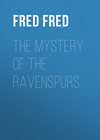Read the book: «The Weight of the Crown», page 7
CHAPTER XVI
WAS IT RUSSIA?
Dr. Varney went slowly and thoughtfully back to the house after seeing Jessie start on her adventure. The brilliant old scientist had ample food for thought as he walked along. It was not as if he did not thoroughly grasp the situation. He had a reputation for something besides medicine; his practice largely lay amongst diplomatists and statesmen. Once, even, he had been summoned to a consultation on the illness of a king.
So that he knew most of the inner political game by heart. He could be bold and discreet at the same time. Very little of the scandal that hung over the Asturian throne like a blighting cloud was hidden from him. He could have placed his finger on the fatal blot at once.
In the library, Lord Merehaven with Ronald Hope and Lechmere were still talking over matters. Sir Reginald Lancing had disappeared, to Varney's relief. The stricken old man had avowed himself to be better. He was sorry that he had obtruded his grief on his friends; he would like to go home at once; he did not wish for anybody to accompany him.
"All this is very irregular," Lord Merehaven was saying as Varney joined the group again and carefully closed the door behind him. "According to all precedent I should not discuss this matter with you gentlemen at all."
"But think what we may accomplish," Ronald said eagerly. "The whole scandal may be averted. I fancy that you can trust everybody here, my lord."
"I have been the recipient of a few secrets in my time," Lechmere said drily. "Lord Merehaven will not forget what my audacity accomplished in the Moscow case."
"Officially, I know nothing about it," Lord Merehaven murmured. "Officially – "
"Officially you know nothing about this matter," Lechmere interrupted with some impatience. "A Minister cannot hold himself responsible for the statements made in an irresponsible paper which is notoriously controlled by Americans. The Mercury suggests that certain papers have been stolen, and that one of the culprits has fled, whilst the other has committed suicide. Who shall say that Mr. Maxwell has fled? Certainly he has departed suddenly for Paris. Unfortunately, Captain Lancing has committed suicide. At the same time, it is a notorious fact that he has had heavy losses at cards and on the turf, which may account for everything. And as to those papers alleged to be stolen, why, Lord Merehaven had them in his own hands at seven o'clock to-night."
"An excellent piece of political logic," said Lord Merehaven. "I could not have given a better explanation from my place in the House. But I fear that if I were pressed to say that I had taken steps to discover if those papers were intact – . You see my position?"
"I must speak plainly," Lechmere went on. "It is any odds that the papers have gone. The thing has been arranged for some time; the house where the papers were to be handed over to the arch thief was actually fixed. The arch thief, taking the thing as a settled fact, gave a broad outline of what was going to happen to the editor of the Evening Mercury. He saw a chance of a 'scoop,' and decided to take the chance of the papers not being delivered. If there was a hitch at the last moment, Hunt could easily wriggle out of it. But the papers changed hands, and Hunt's bold plan was justified. Lancing saw the paragraph and shot himself."
"But why should he shoot himself?" Lord Merehaven asked.
"I fancy that is pretty obvious," Lechmere went on. "Lancing was betrayed. Don't you see that Hunt promised to-morrow to give a précis of the stolen documents? If my deductions are correct, Lancing only borrowed the papers on the distinct understanding that they should be returned. Lancing had a large sum of money for that act of his. If we find that he had considerable cash about him I shall be certain. No sooner had he parted with the papers than he was coolly betrayed. The receiver of the papers simply laughed at him. Who was the receiver of the papers?"
"Some foe of England," Lord Merehaven said. "A Russian agent probably. If those papers are made public we shall have our trouble for our pains in Asturia, and Russia will buy the King of Asturia out. So far, I can see this thing quite plainly."
"You are right beyond a doubt, my lord," Lechmere went on. "With your permission I am going to locate exactly where those papers went. They went to a woman."
"I should doubt that," Lord Merehaven said. "I should doubt it very much indeed."
"Nevertheless, I am going to prove it to you," said Lechmere.
"Those papers must have been disposed of after seven o'clock to-night. By nine o'clock Lancing had read in print how he had been cruelly betrayed. Well, with all his faults, Lancing was a man of high courage. He had great physical strength as well. What did he do directly he read that paragraph and saw that he had been deluded. Did he go off and shoot himself at once? Not he! He got up from the dinner table of his club quite quietly and called a hansom. Obviously he was going to lose no time in seeing the person to whom he delivered the important State papers. Is that logic?"
The listeners standing round the fire-place admitted that it was. Interest was painted on every face.
"We know now that Lancing failed in his mission which was proved by the fact that he returned to his club and shot himself there. Now, I conclude that Lancing did not fail to find his deceiver. He would not have given up the search so easily as all that. It was not the man's character, nor could the deceiver have left London, because it was imperative that the same deceiver should be on the spot to watch the progress of events. My idea is that Lancing saw the deceiver and failed to get the papers back."
"Then where does his strength and courage come in?" Merehaven asked. "Remember that you began to draw a series of inferences from that same courage."
"I have not finished yet, my lord," Lechmere said quietly. "Lancing failed because his courage and personal strength was useless in this case. If he had been dealing with a man he would not have hesitated. But poor Lancing was seriously handicapped by the fact that he had a woman for his antagonist. You can't ill-treat a woman; you can't damage her features and knock her teeth out. And that is why Lancing failed. He saw the woman, and she laughed at him. She defied him to do his worst. He could not denounce her without proclaiming his own shame, and the clever woman traded on that. Therefore Lancing went and shot himself. What do you think of my argument?"
It was evident from the silence that followed that each of the little group was considerably impressed by the clear logic of the speaker's story. It was not often that Lechmere said so much, though his reputation was high, and more than one knotty trouble had been solved by him.
"Our friend is absolutely right," Varney said at length. "The more I think of it the more certain I am. Perhaps he can tell us the name of the woman?"
"That I am also in a position to do," Lechmere proceeded, without the slightest shade of triumph in his voice. "Accident helped me to that. In the hall some time ago there was a little scene between Countess Saens and her maid. The maid came to say that a strange robbery had taken place at the house of the countess. Nothing had been taken but papers from a certain drawer. Now I was close by and heard that, and I had a good opportunity of seeing that lady's face. Rage, anger, despair, murder almost, danced like so many devils in her dark eyes. The countess was quick to recover herself, but she had betrayed herself to me. I did not think so very much of this at the time, but when I subsequently saw the countess leave the house and subsequently find that she had gone off to have supper with Hunt of the Evening Mercury in a private room at the Carlton, I knew as well as if she had told me that she had met Hunt to tell him why she could not give him the chance of printing the crux of those stolen papers in the morning edition of the Mercury– for the simple reason that the papers had in turn been stolen from her."
Ronald Hope turned as if to speak, then as suddenly changed his mind. It would be a mistake to still further complicate matters at this junction, he thought.
"It was to Countess Saens that Lancing delivered those papers," Lechmere said finally. "Lord Merehaven looks dubious; but his lordship does not know, and I do, that the brilliant society creature, Countess Saens, is really one of the cleverest adventuresses in Europe – a police spy, passing as a kind of socialist and the rest. If I could see the King of Asturia – "
"You shall," Varney snapped out. "You shall see him before half an hour has passed. Stay where you are and – Stop! Hope, keep an eye on Prince Mazaroff, and see that he does not leave the house."
CHAPTER XVII
A BOW AT A VENTURE
With a strong feeling of congratulation that he had gleaned the whole story of her wild adventure from Jessie Harcourt, Varney walked coolly up the staircase. He had little difficulty in locating the room where the dissolute ruler of Asturia lay. It was the only locked door in that corridor, and he had the key in his pocket, which key, it will be remembered, Jessie handed over to him.
The lights were still burning there; the king still lay in the huddled uniform of General Maxgregor on the bed. At the end of the corridor a telephone gleamed. Varney crossed over and called up his own confidential servant, to whom he gave a long message. This being done, he returned to the bedroom and carefully locked the door behind him. He crossed over to the bed and shook the royal occupant much as a policeman shakes a drunken tramp asleep in a gutter.
"Get up," he said. "Get up; you are wanted at once. And drink this – do you hear?"
The blear-eyed wretch sat up in bed. He was shaking from head to foot. His hands shook as he held them out for the contents of the bottle that Varney was holding – the rest of the drug that had been administered to Sir Reginald Lancing.
"I hope it won't hurt me," the king whispered. "My doctor here, Dr. Varney – "
"I am Dr. Varney," said the latter coldly, "only you are still too drunk to know who I am. I am not likely to give you anything harmful – at least, not for the present. Where are your clothes? You never came here in that uniform."
"I was in evening dress," the king said helplessly. "Somebody must have changed with me. Look and see, there's a good fellow. Must have been a big fellow who played this trick on me."
Varney gave a grunt of disappointment. He recollected now that Maxgregor had gone off in the guise of the king. Therefore, if the king had that proposed treaty of abdication in his pocket, the same was in the possession of Maxgregor at this moment.
"You are in the house of Lord Merehaven," Varney said. "You should have come here to-night with the queen. In the interests of your country, and in the interests of Europe, you should have been here. Instead of that you go off somewhere and get wretchedly drunk in some gambling-house. It was by great good luck that you were found and conveyed secretly here by the garden entrance. Kings have done some disgraceful things in their time, but nothing quite so bad as your conduct to-night. Where is the document that Prince Mazaroff gave you to sign?"
It was a bow drawn at a venture, but the shaft went home.
"I don't know," the king groaned. "I put it in my pocket. It was not the thing to sign all at once. Shouldn't have pluck enough whilst I was sober. Then I had too much champagne. What was that you gave me to drink just now? Seems to make a new man of me. Haven't felt so fit and well for years. Feel as if I could do anything now."
"You'll want all your manhood presently," Varney said coolly. "Your father was a man of courage, as I found out for myself in his last painful illness. You had pluck enough as a boy; you'd have it again now if you dropped your champagne. Wash yourself well, and make yourself look as respectable as possible. We are going downstairs."
"What, like this!" the king cried in dismay. "In a uniform that is far too big – "
"Nothing of the kind. There is a change coming for you from your hotel. My confidential servant is seeing to it, and he will be here presently. With clean clothes and linen and an order or two you will be a passable king yet. Go and wash yourself at once. You are in my hands to-night."
There was a cold, stinging contempt in Varney's tones by no means lost on the listener. Perhaps some sense of shame was stirring within him, for no reproof rose to his trembling, bibulous lips. Varney passed out presently, locking the door behind him as coolly as if he had been a gaoler. At the foot of the stairs a neat-looking footman was waiting with a parcel for Varney. As he took it Hope crossed the hall. There was a look of alertness, a desire for battle in his face.
"What is going on?" Varney asked. "Something seems to have happened?"
"Count Gleikstein is here," Ronald whispered. "The Russian chargé d'affaires, in the absence at St. Petersburg of the Ambassador. You can imagine what he has come for. There was a great battle of wits going on in the salon. The Queen of Asturia is talking to Gleikstein, and I have secured the presence of Prince Mazaroff. Lechmere looks anxious for the fray, and I should say from the expression on his face that he has a knife up his sleeve. If we could play some strong card – "
"We are going to," Varney snapped, as he hugged his bundle under his arm. "Only keep the ball rolling for another quarter of an hour, and I shall be ready for you. Listen!"
Very rapidly Varney whispered a few instructions into the ear of Hope. The latter grinned delightedly, then his face grew grave again. The thing was serious enough, and yet there was a fine element of comedy in it. It was diplomacy gone mad. On the hall stand was a stack of visiting cards. On one of them, chosen at haphazard, Hope wrote a message. He trusted that the queen would understand; in fact, he felt sure that she would.
The little group in the salon, under the famous Romney and the equally famous Velasquez, was a striking one – the Queen of Asturia, tall and stately, and smiling as if perfectly at her ease; by her side Count Gleikstein, the Russian chargé d'affaires, slim waisted, dark of face and stern of eye, yet with a waxed moustache and an air that gave a suggestion of effeminacy to him. Lechmere was lounging by in a listless kind of way, and yet from time to time there was an eager tightening of his mouth that proved him ready for the fray. Prince Mazaroff completed the group.
Ronald Hope came up with a respectful bow, and tendered the card to the queen. She glanced at it leisurely; her face betrayed nothing as she read the message and handed the card back to Ronald again. One grateful look flashed from her eyes.
"I regret that I cannot," she said. "I have so many calls of that kind on my time. If the lady is a friend of yours, Captain Hope, I may stretch a point in her favour. She may call on my secretary at eleven o'clock to-morrow morning."
Ronald bowed deeply as if charged with a message, and hastened into the hall. The card he tore into small fragments and cast into a waste paper basket under one of the hall tables. Then he went back to the striking group under the picture again.
"I am afraid that it concerns all of us," the count was saying in a dangerously insinuating voice. "Of course, one can hardly be responsible for what the papers say, but in the present dangerous state of public opinion in Asturia – the queen will pardon me?"
"I pardon anybody who does their duty to their country at any cost," the queen said. "If we could produce those papers that your royal master is so suspicious about – "
"Then I am to understand that some papers of importance have really been stolen?" the count said swiftly.
"On the contrary, you are not to understand anything of the kind," Lord Merehaven smiled. "My dear count, I could lead you a fine wild-goose chase if I chose to allow your imagination free run. As a matter of fact, the papers you allude to were in my own hands at seven o'clock this evening. It is hardly possible that they could have been stolen and their contents made known to an American paper within an hour from that time. So easy am I in my mind that I have not even sent down to my office to see if the papers are still extant. And when you see the King of Asturia – "
"But I understand that he has gone to Paris?" Count Gleikstein said, with a swift, meaning glance at the queen. "Of course, if his majesty were here, and could give us an assurance that he has in no way given his authority and let you know what I mean. I am afraid that those agreeable Bohemian excursions that his majesty is so fond of are not regarded in Asturia in the same liberal light that they might be. Still, your assurance, my dear Lord Merehaven, will not – "
"Will not weigh like that of his majesty," Merehaven said. "If he were only here – "
"He has been detained," the queen said, ignoring a meaning smile that passed between the count and Prince Mazaroff. "If I could only have a message – "
A quick, smothered cry broke from Mazaroff as he looked to the door. Gleikstein followed his glance, and his face fell wofully. The queen smiled and advanced one step towards the door. Her dark eyes were filled with a great and lasting joy.
"I think your kindness is going to be rewarded, count," she said. "Yes, I was not mistaken."
A tall footman in the doorway announced – "His Majesty the King of Asturia!"
CHAPTER XVIII
WATCHING
It was not difficult for Jessie to guess the identity of the man who addressed her. Only a man who loved and felt sure that he was loved in return would have spoken to a girl like that. This was Charles Maxwell beyond a doubt. Nice-looking enough, Jessie thought, with a pleasing, amiable face – perhaps a trifle too amiable, but there was no mistaking the power in the lines of the mouth.
"What are you doing here like this?" he asked. "Heavens! has all the world gone mad to-night?"
The bitterness of despair rang in the speaker's voice. Jessie noticed that Maxwell was dressed not in the least like men in his position usually dress at that time of the night. He wore a grey flannel suit and a panama hat pulled down over his eyes.
"I came on urgent business," Jessie said. "I presume that you are Mr. Maxwell?"
"Why should I deny it?" the other asked. "I am Charles Maxwell, and the most miserable dog in London. But I am forgetting. Why do you ask me such a foolish question, Vera?"
"Because I want to be quite sure of my ground," Jessie said. "And because I am not Miss Vera Galloway at all. If you look at me very closely you will see that for yourself."
Maxwell stared at Jessie in a dull, wooden kind of way, as if the whole thing were past his comprehension.
"Yes," he said, "there is a difference, but it is so subtle that even I should not have noticed it unless you had called my attention to it. But I know who you are now. You are Miss Harcourt, daughter of Colonel Harcourt, late of the – th. I have often told Vera of the wonderful likeness between you. If you should ever meet her in private life – "
"I have met her, I am personating her at the present moment," Jessie whispered.
"Amazing!" Maxwell exclaimed. "But I understood that you were – that you had been – in short – "
"Engaged in a Bond Street shop," Jessie finished the sentence. "So I was till to-day, when I was discharged through no fault of my own. Miss Galloway sent for me to take her place. Secretly I have played her part all this evening. And she went away dressed in my simple black clothes – "
"But why?" Maxwell demanded jealously. "Why all this absurd mystery?"
"Surely you can guess? Why do you look so suspicious? I am not altogether in Miss Galloway's confidence, but I understand that she wanted to save somebody whom she loved – somebody that was in trouble. It requires no great intelligence to guess that you were the person in question. It was all connected with those papers missing from the Foreign Office."
"I know no more about it than the dead," Maxwell said vehemently. "The papers in question – and others – were as much in Lancing's custody as mine. It was he who was to blame, though I admit that I locked the papers away to-night after Lord Merehaven had done with them. When I saw the Mercury I was horror-stricken. I guessed exactly what had happened."
"How could you guess what had happened?" Jessie asked.
"Because I have had my suspicions for some time," Maxwell said. "I dismissed those suspicions as unworthy of me and insulting to Captain Lancing. I know that he was greatly infatuated with Countess Saens, whom a Mr. Lechmere, a late Queen's Messenger, had warned me against as no better than a Russian spy. Lancing was mad over her. There is not the slightest doubt that she induced Lancing to let her have those papers to copy. Then she refused to return them, and Lancing committed suicide. That is what I make of it."
"The sensational report in the Mercury went farther than that," Jessie said. "It is assumed that you are a party to the conspiracy, and that you fled to Paris. Is that true, or going to be true?"
"As heaven is my witness, no," Maxwell said in a hoarse whisper. "When I had made up my mind what had happened, I determined to get possession of those papers. I vanished, saying that I was called suddenly to Paris. For the last four hours I have been dogging Countess Saens. I followed her here, and I am not going to lose sight of her until she is safely at home. And when she is once safely at home, I am going to do a desperate and daring thing. What is she doing here?"
Jessie made no reply for the moment. She had pulled her wrap over her face again so that she should not be recognized. She was watching the movements of Countess Saens breathlessly. The woman had passed up the steps into the big hall beyond the swinging glass doors. She seemed to be arguing with a porter, who shook his head in an emphatic way. Evidently the countess was angry; so much could be seen from her gestures and the shake of her shoulders.
"She is trying to see a patient at irregular hours," Jessie said, "and the porter is adamant. I pray from the bottom of my heart that she may fail."
"Is this another piece in the puzzle?" Maxwell asked hopelessly.
"It is the key-piece of the problem," said Jessie. "Ah, the porter is not to be moved. He has sent off an under porter, possibly to call one of the house surgeons. See, the countess sits down."
Surely enough the countess had flung herself angrily into a seat. Nobody seemed to care much about her, for she waited ten minutes without any sign of anybody in authority. Meanwhile Jessie was making Maxwell au fait with the situation.
"You threatened some dangerous and desperate enterprise a little later on," she said. "I suppose that is a supreme effort to try and get those papers?"
"You have guessed it," Maxwell said grimly. "If I could do that, the whole situation would be saved. We could do anything; we could point to Lancing's suicide as the result of reckless gambling. Mind you, that would be more or less true. If Lancing had not been desperately situated, he would never have yielded to the countess's fascinations and sold those precious documents."
"Yes, yes," Jessie interrupted. "But unless I am greatly mistaken, you have been forestalled. Somebody else has already removed the documents from Countess Saens's custody."
"You don't really mean that! What was it – a case of diamond cut diamond?"
"Yes, but not quite in the way you imagine. Those papers were stolen in turn from Countess Saens to-night, taken from a drawer in her bedroom by Miss Galloway."
Maxwell pressed his hands to his head. The situation was too much for him. He groaned for an explanation.
"I can only surmise," Jessie said. "But presently you will have to admit that I have very strong grounds for my surmises. In some way Miss Galloway obtained a clue to what was about to happen. That is why I was called in to take her place, so that she could have an hour or two without being suspected. An hour or so ago Countess Saens's maid came to Merehaven House with the information that there had been a burglary in the countess's bedroom, but that nothing besides some papers seemed to be missing. That those papers were important could be guessed by the ghastly yet furious expression on the lady's face. The maid was pressed for a description of the thief – who, by the by, was a woman. And then and there the maid pitched upon me. She declared point blank that it was I who committed the burglary. What do you think of that?"
"You are a clever young lady," Maxwell said hoarsely. "Pray go on."
"The maid stuck to her guns, though everybody laughed at her. She said the thief was dressed in plain black, and as I was in evening dress, and had been seen all the evening, those who heard were amused. But I understood. In my plain black dress Miss Galloway had gone to the countess's house and stolen those papers. The thing was as clear as daylight to anybody behind the scenes. Under the circumstances, your prospective burglary would be so much loss of time."
"I quite understand that," Maxwell muttered. "It is exceedingly clever of you to read between the lines so clearly. Vera has done this for my sake. But how did she know – how could she possibly tell what was going to happen, and when those papers were to be found? Of course, I guessed where the trouble lay directly I saw the Mercury paragraph, but Vera! And she never takes the slightest interest in politics. What are you looking at?"
Once more Jessie was staring intently past the swinging doors of the hospital into the big hall beyond. The countess had now risen from her chair and was facing a little man with a bald head and gold-rimmed spectacles, who appeared to be explaining something to her. Jessie could see him bow and shake his head. Her breath came very fast.
"Why are you so interested in the countess's present action?" Maxwell asked.
"Because she has come here to try and see a patient," Jessie whispered intently. "From the bottom of my heart, I pray that she may fail. If she succeeds we are ruined, you are ruined. For the patient is no other than Vera Galloway."















